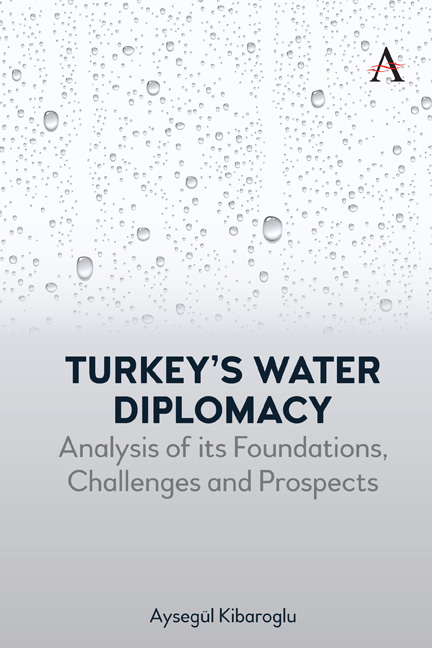Book contents
- Frontmatter
- Contents
- Acknowledgements
- List of Abbreviations
- Introduction
- 1 Institutional Setting
- 2 Water Diplomacy Principles
- 3 Turkey’s Evolving Position vis-à-vis International Water Law
- 4 The Role of History and Geography in Turkey’s Evolving Water Diplomacy
- 5 Analyzing Non-State Actors and Processes in Turkey’s Water Diplomacy Framework
- Conclusion
- References
- Index
- Frontmatter
- Contents
- Acknowledgements
- List of Abbreviations
- Introduction
- 1 Institutional Setting
- 2 Water Diplomacy Principles
- 3 Turkey’s Evolving Position vis-à-vis International Water Law
- 4 The Role of History and Geography in Turkey’s Evolving Water Diplomacy
- 5 Analyzing Non-State Actors and Processes in Turkey’s Water Diplomacy Framework
- Conclusion
- References
- Index
Summary
Diplomacy is a set of initiatives that aims at reaching agreeable solutions between parties who have diverging interests in potentially conflict-laden issues that might otherwise escalate into a hot confrontation. Diplomacy encompasses the processes and institutions by means of which national interests and identities of sovereign states are represented to one another (Wiseman and Sharp 2012) and is enshrined in international law, which states use to explain and justify their policies to actors concerned before the international system. Diplomacy brings state behaviour into the realm of logic and order, by explaining it in terms of existing international legal norms. It is thus a product of foreign policy, combined with international law (Hurd 2015). In line with these definitions, this book aims to assess ‘the processes and institutions’ in Turkey's water diplomacy framework with a specific focus on its evolving position vis-à-vis international water law.
Water is vital to many levels of human survival. It fluctuates both in space and time, and has multiple and conflicting demands in terms of its use. This means that flows crossing international boundaries can be a source of tension between states (Wolf 1998). While tension does not necessarily always lead to hot confrontation, early coordination and cooperation between riparian states through water diplomacy mechanisms can often help solve the problems that may arise thereof. Water diplomacy is a process of interactions between states that ultimately hope to prevent hostility through dialogue. The role of water diplomacy in the context of transboundary waters is to foster cooperation among riparians. A broader and more inclusive definition would posit that ‘water diplomacy includes all measures by state and non-state actors that can be undertaken to prevent or peacefully resolve (emerging) conflicts and facilitate cooperation related to water availability, allocation or use between and within states and public and private stakeholders’ (Huntjens et al. 2016, 13).
The main objective of this book is to elucidate Turkey's water diplomacy framework with its key actors and guiding principles. Thus, the analysis adopts an institutionalist approach, by presenting and emphasizing the role of the legal and institutional foundations upon which Turkey's water diplomacy framework rests.
- Type
- Chapter
- Information
- Turkey's Water DiplomacyAnalysis of its Foundations, Challenges and Prospects, pp. 1 - 8Publisher: Anthem PressPrint publication year: 2021



